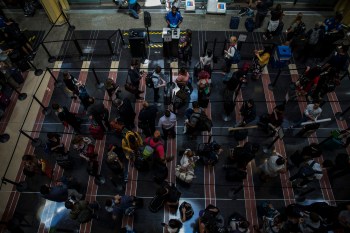The Federal Aviation Administration keeps flying
Steve Chiotakis: The U.S. House will likely vote today on a near $5.5 billion deal that would avoid another Federal Aviation Administration shutdown. But a major sticking point is federal subsidies for flights out of rural airports.
Marketplace’s Nancy Marshall Genzer checked out one such airport in rural Maryland.
Nancy Marshall Genzer: At least four times a day, a Cape Air pilot fires up a nine-seat propeller plane in Hagerstown, Md., and takes off for Baltimore. Sometimes with no passengers aboard. The federal government pays Cape Air more than $400 per flight — about $1 million a year. Passengers or no. I took the flight last Friday, and I was the only one onboard.
The subsidy program, known as Essential Air Service, was created in the 1970s to ensure that airlines served rural airports. Today, airlines at more than 150 airports get the subsidies, and it costs the federal government about $200 million a year. Critics say it’s a waste of money.
N.Y.U. law professor Michael E. Levine helped create the program. He says it was supposed to be temporary.
Michael E. Levine: But you can really ask, at a time when we’re closing school libraries, whether we should be spending money to provide air service that’s only being used by a couple people a day.
Over the summer, Congress agreed to cut Essential Air Service funding at 13 airports, including Hagerstown. Phil Ridenour is the director of the Hagerstown airport. He says taxpayers don’t pay for the subsidies; they come from airline ticket and fuel taxes. And if they were eliminated, the money wouldn’t go toward deficit reduction.
Phil Ridenour: The money still goes to the FAA and it would just be divvied out in another portion of an FAA program.
And Ridenour says the subsidies are essential for Hagerstown businesses. I flew back from Baltimore to Hagerstown with a small business owner. There were five of us on that flight. Chris Moleskie owns the Wetsuit Warehouse in Hagerstown. He was returning from a trade show in Florida.
Chris Moleskie: It’s important we have an airport five miles away from our house, eight miles away from our office.
Moleskie says he wouldn’t have gone to the trade show if he’d had to drive the hour and a half from Hagerstown to Baltimore.
I’m Nancy Marshall Genzer for Marketplace.
There’s a lot happening in the world. Through it all, Marketplace is here for you.
You rely on Marketplace to break down the world’s events and tell you how it affects you in a fact-based, approachable way. We rely on your financial support to keep making that possible.
Your donation today powers the independent journalism that you rely on. For just $5/month, you can help sustain Marketplace so we can keep reporting on the things that matter to you.


















